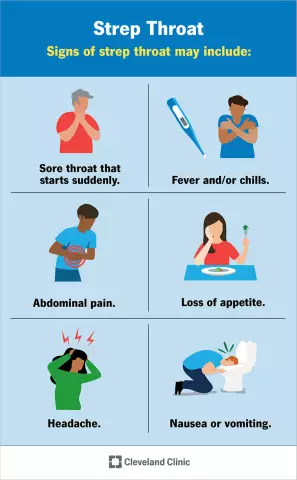- Author Rachel Wainwright wainwright@abchealthonline.com.
- Public 2023-12-15 07:39.
- Last modified 2025-11-02 20:14.
Throat cramps

Spastic contractions of the pharyngeal muscles are popularly known as spasms in the throat, which are not related to vascular pathology, but to a violation of the innervation of the pharynx. The pharyngeal ring is formed by both branches of the autonomic nervous system:
- Sympathetic - the nerve processes of the cervical ganglia of the spinal cord trunk;
- Parasympathetic - the second pair of the trigeminal nerve (maxillary), the glossopharyngeal nerve and the superior branch of the vagus nerve.
Parasympathetic nerve fibers are involved in providing sensitivity and motor activity, while the branches of the trunk of the sympathetic nervous system are "responsible" for the general reactions of the body.
Nerve innervation provides vascular tone, on which the nutrition of the cells of the pharyngeal ring depends - this, in fact, is the main function of the nervous system. The parasympathetic division is aimed at providing nutrients, and the sympathetic nervous system causes the mobilization of energy reserves for emergency action. This is a kind of nutrition from two policies: positive and negative. A "short circuit" causes a spasm in the throat, which makes normal nutrition and adequate breathing impossible.
Throat cramps, reasons
The most dangerous condition occurs upon contact with cold (below 20 ° C) water, this is the so-called "dry drowning". The upper parts of the respiratory tract, when liquid enters them, are accompanied by strong, transcendental irritation of the sympathetic system trunk. The result is a lightning-fast reaction of the superior laryngeal nerve, which leads to spasm of the vocal cords. It is a defensive reaction to prevent water from entering the respiratory tract. When the vocal cords are tightly closed, almost "tightly", reflex cardiac arrest occurs. This condition is fatal. A person dies without having time to "choke".
Basically, less dangerous spasms in the throat are noted, the causes of which can be various diseases and pathological conditions that are of an organic nature:
- Abscess of the tonsils of the pharyngeal ring of Pirogov-Valdeer, as an acute purulent inflammation, is accompanied by violent impulses of the nerve pathways, resulting in unpleasant sensations in the throat, accompanied by acute pain;
- Trismus of the chewing muscles. Their innervation is also provided by the trigeminal nerve, therefore, with its inflammation (neuritis), convulsive contraction occurs not only of the pharyngeal ring, but also of the jaws. A spasm in the throat is accompanied by a strong contraction of the mouth;
- The defeat of the glossopharyngeal nerve leads to choking not only with saliva, but also with air due to irritation of the epiglottis. Similar conditions, when cramps develop in the throat, are accompanied by a cough and are noted with lesions of the central nervous system: dimelienizing diseases, residual effects after a stroke;
- Endocrine system diseases. The mechanical cause of a spasm in the throat when swallowing is pressure on the larynx of an enlarged thyroid gland. And with tumors of the adrenal glands (pheochromocytoma), an increased formation of adrenaline occurs, which prevents the formation of saliva. In such cases, cramps in the throat during swallowing are caused by "dry throat", that is, active irritation of the nerve endings with food, including liquids;
- Diseases of the gastrointestinal tract, accompanied by reflux esophagitis (reflux of the contents of the stomach into the esophagus). The mucous membrane of the esophagus is not adapted to the action of hydrochloric acid, therefore, when irritated, a spasm occurs in the throat, which is a defensive reaction.
In addition to the causes caused by damage to muscle, nerve, vascular cells, there are functional factors that can cause spasms in the throat, which are of an unstable nature, but they can not always go away without active medical intervention. The simplest example of functional pathology is the ingress of a foreign body into the pharynx. The fishbone irritates the intact nerve fibers, causing the pharyngeal muscles to contract, which increases with swallowing. Or, conversely, after swallowing a solid lump of food or a pill, a person has a feeling of prolonged spasm in the throat, as if the swallowed object for a long time "does not fall through, but stands in the throat." Drinking water does not always help relieve the feeling of a lump in your throat. This condition is associated with a small amount of saliva when swallowing, as a result of which,irritation of the pharyngeal ring receptors occurs. In some cases, the "lump falls through" only after a few hours.
Nervous spasm in the throat

Of course, each convulsive contraction of the pharynx is accompanied by irritation of the peripheral nervous system, but such a definition as a nervous spasm in the throat characterizes only a stress response. The parasympathetic nervous system is depressed under stress, so little saliva is released, and the throat “dries up”.
The most striking manifestation of such a spasm in the throat is the "hysterical lump". In persons prone to hysterical reactions, during an attack from somewhere inside the body, a spherical valve seems to roll up to the throat, blocking not only the esophagus, but also the respiratory tract. Diagnosis of a hysterical seizure is not difficult: it always occurs in the presence of people and is provoked by a traumatic situation.
Throat cramps, treatment
When throat cramps occur, treatment is carried out by specialists, depending on the causes of this condition. Innervation disorder in the competence of a neuropathologist. With hormonal pathology, the help of an endocrinologist is needed. Diseases of the digestive system are treated by a gastroenterologist. Hysterical manifestations under the supervision of a psychiatrist.
YouTube video related to the article:
Found a mistake in the text? Select it and press Ctrl + Enter.






